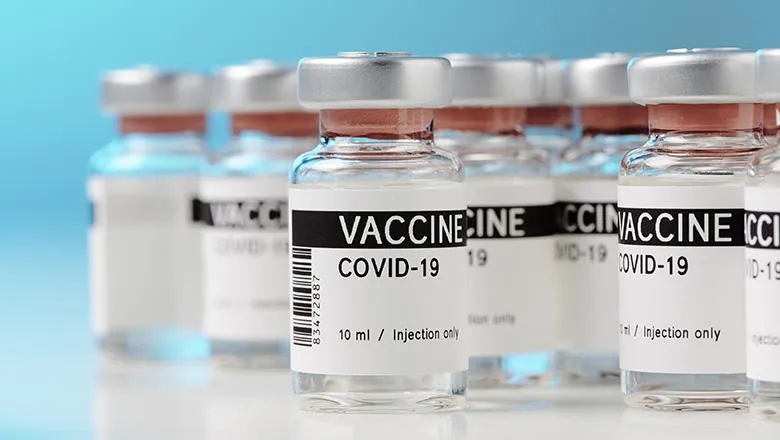09 August 2020
Who's least likely to say they'll get a Covid-19 vaccine?
One in six say they're unlikely to or definitely won’t get one, rising even higher among some groups

The Policy Institute ran a follow-up question to one used in this survey, to look at whether a small word change affected responses. Read more from FullFact.
–––––––––––––––––––
Coronavirus uncertainties: vaccines, symptoms and contested claims
View the full report for charts and detailed findings
- Only half the population (53%) say they’d be certain or very likely to get a vaccine against coronavirus, if one becomes available, with one in five (20%) fairly likely, and one in six (16%) saying they are unlikely to or definitely won’t, according to a new study.
- Only 4% say we’ll never be able to vaccinate the population – but less than half the public (44%) think we’ll able to in the next 12 months.
The research, by King’s College London and Ipsos MORI, finds that a greater likelihood of not getting a potential vaccine is linked to beliefs, attitudes and values that reflect greater scepticism about science and authority and less concern about the Covid-19 pandemic.
Higher proportions of the following groups say it’s doubtful they would get a vaccine, or say they definitely won’t:
- Those who believe face masks are bad for people’s health (37%), who believe masks do not reduce the spread of Covid-19 (34%), and who think the government only wants people to wear them as a way of controlling the public (34%).
- Those who strongly agree that too much fuss is being made about the pandemic (36%), who say they do not find coronavirus stressful (27%) and who say they’re not worried about lifting lockdown restrictions (24%).
- Those who say they’re very much the kind of person for whom it's important to make their own decisions (24%) and who say they're not at all the kind of person who follows the rules at all times (24%).
- Those who say they do not trust scientific experts more as a result of how they’ve helped during the crisis (33%) and who believe the UK government acted too slowly to control the spread of Covid-19 (27%).
There is also an age divide in the likelihood of getting vaccinated, with 16-24s (22%) and 25-34s (22%) twice as likely as 55-75s (11%) to say they’re unlikely to do so or definitely won’t.
The study is based on 2,237 interviews with UK residents aged 16-75, carried out online between 17 and 20 July 2020.
It finds that certain behaviours and experiences are also linked to being unlikely to get a potential coronavirus vaccine:
- Around a quarter of those who say they don’t wear face masks (24%) and those who have had or think they’ve had coronavirus (23%) say they probably or definitely won’t.
- Where people’s knowledge comes from is also a factor: 27% of those who say they get a great deal of information on Covid-19 from WhatsApp say they’re unlikely to or definitely won’t get a vaccine.
Overall, only half the population (53%) say they’d be certain or very likely to get such a vaccine, with one in five (20%) fairly likely.
While significant proportions of the population are uncertain about whether they would get the vaccine, there is high confidence that we will develop one: only 4% of people say it’ll never happen – but less than half the public (44%) think we’ll have one in 12 months or less.
Some are also still uncertain about what the key signs of Covid-19 are:
- Many know at least one of the three main symptoms of coronavirus, as identified by the NHS, with 81% recognising two – but only 31% correctly recognise all three.
Professor Bobby Duffy, director of the Policy Institute at King’s College London, said:
“Misperceptions about vaccines are among our most directly damaging beliefs, and they’re clearly influencing people’s intentions during the coronavirus crisis. While one in six in the UK say they are unlikely to or definitely won’t get a potential vaccine against Covid-19, this rises to around a third or more among certain groups, with a clear link to belief in conspiracy theories and mistrust of government, authority and science.
“Vaccines are one of our greatest achievements, and there is a great deal of faith that we’ll eventually develop one for Covid-19 – but more still need to be convinced of how important it could be for ending this crisis.”
Gideon Skinner, research director at Ipsos MORI, said:
“Britons are slightly more likely to say they’ll get a vaccine for Covid-19 than one for seasonal flu, but it is still deeply concerning that we see almost a quarter of 16-34-year-olds saying they’re unlikely to get vaccinated for Covid-19 if one becomes available. Previously the public have told us that an announcement of a successful vaccine would make a big positive difference to how optimistic they feel, which suggests at least some awareness of how critical vaccinations have been in the past in defeating disease, but this data should serve as an important staging post for the NHS and the government to combat misperceptions about vaccinations, particularly among young people and those who already have their doubts about the current pandemic.”
Technical details
Ipsos MORI interviewed a sample of 2,237 adults aged 16-75 in the United Kingdom using its online i:omnibus between 17 and 20 July 2020. Data has been weighted to the known offline population proportions for age within gender, government office region, working status, social grade and education. All surveys are subject to a range of potential sources of error.
